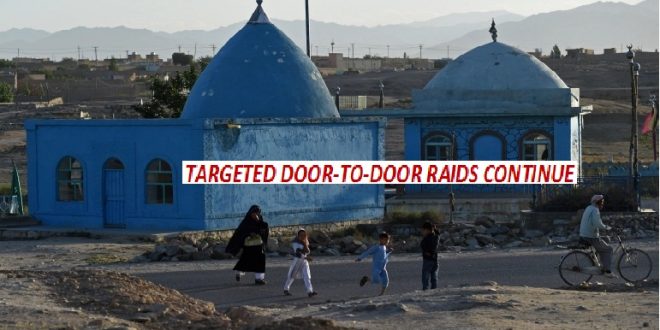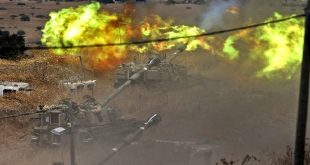21-08-2021
By SJA Jafri + Bureau Report + Agencies
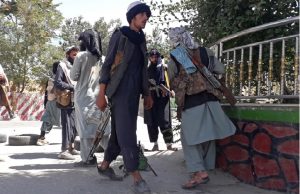 KABUL/ ISLAMABAD/ LONDON/ NEW YORK: Taliban fighters massacred nine (9) ethnic Shia Hazara men after taking control of Afghanistan’s Ghazni province last month, Amnesty International has said in a new report.
KABUL/ ISLAMABAD/ LONDON/ NEW YORK: Taliban fighters massacred nine (9) ethnic Shia Hazara men after taking control of Afghanistan’s Ghazni province last month, Amnesty International has said in a new report.
In the findings published on Thursday, witnesses gave accounts of the killings which took place from July 4 to 6 in the village of Mundarakht, Malistan district. The accounts undermine the Taliban’s claims that it has changed.
The Hazara community is Afghanistan’s third-largest ethnic group, with mostly Shia Muslims. They have long faced discrimination in the Sunni majority country and were previously persecuted by the Taliban.
According to the Amnesty report, six of the men were shot and three were tortured to death, including one man who was strangled with his scarf and had his arm muscles sliced off.
On July 3, fighting intensified in Ghazni province between Afghan government forces and the Taliban. Villagers told the human rights watchdog that they fled into the mountains to traditional iloks, their summer grazing land, where they have basic shelters.
There was little food for the 30 families that fled. The next morning, on July 4, five men and four women returned to the village to gather supplies. On their return, they found that their homes had been looted and that Taliban fighters were lying in wait for them, Amnesty said.
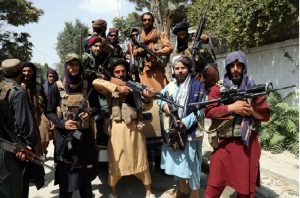 One man, Wahed Qaraman, 45, was taken from his home by Taliban fighters who broke his legs and arms, shot him in the right leg, pulled his hair out, and beat his face with a blunt object, the report said.
One man, Wahed Qaraman, 45, was taken from his home by Taliban fighters who broke his legs and arms, shot him in the right leg, pulled his hair out, and beat his face with a blunt object, the report said.
Another man, Jaffar Rahimi, 63, was severely beaten and accused of working for the Afghan government after cash was found in his pocket. The Taliban strangled him with his scarf. Three people that buried Rahimi said his body was covered in bruises, and that the muscles of his arms had been carved off.
Sayed Abdul Hakim, 40, was taken from his home, beaten with sticks and rifle butts, had his arms bound, and was shot twice in the leg and twice in the chest.
One witness, who assisted with the burials, told Amnesty: “We asked the Taliban why they did this, and they told us, ‘When it is the time of conflict, everyone dies, it doesn’t matter if you have guns or not. It is the time of war.’”
‘Cold-blooded brutality’
During the two-day killing spree, three other men – Ali Jan Tata (65), Zia Faqeer Shah (23), and Ghulam Rasool Reza (53) – were ambushed and killed at a Taliban checkpoint as they left the iloks, and attempted to pass through Mundarakht to reach their homes.
Ali Jan Tata was shot in the chest, and Rasool was shot in the neck. According to witnesses, Zia Faqeer Shah’s chest was so riddled with bullets that he was buried in pieces.
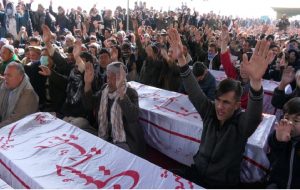 Three more men were killed in their home village. Witnesses told Amnesty that Sayeed Ahmad, 75, insisted the Taliban would not harm him as he was an elderly man, and that he intended to return to feed his cattle. He was killed with two bullets to the chest and another in his side.
Three more men were killed in their home village. Witnesses told Amnesty that Sayeed Ahmad, 75, insisted the Taliban would not harm him as he was an elderly man, and that he intended to return to feed his cattle. He was killed with two bullets to the chest and another in his side.
When the Taliban took control of Mundarakht on July 3, the group killed Zia Marefat, 28, with a shot to the temple as he walked alone to the ilok. Karim Bakhsh Karimi, 45, was also shot, “execution-style, in the head”.
The killings likely represent only a tiny fraction of the death toll inflicted by the Taliban, as the group has cut mobile phone service in many areas they have recently captured, controlling which photographs and videos are shared from these regions, Amnesty said.
Agnes Callamard, secretary-general of Amnesty International, said the “cold-blooded brutality of these killings is a reminder of the Taliban’s past record, and a horrifying indicator of what Taliban rule may bring”.
“These targeted killings are proof that ethnic and religious minorities remain at particular risk under Taliban rule in Afghanistan,” Callamard said.
Amnesty urged the UN Security Council to adopt an emergency resolution demanding that the Taliban respect international human rights law.
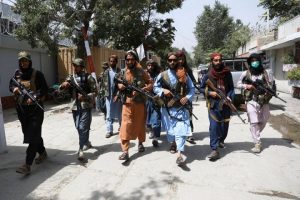 It also called on the UN Human Rights Council to launch “a robust investigative mechanism to document, collect and preserve evidence of ongoing crimes and human rights abuses”.
It also called on the UN Human Rights Council to launch “a robust investigative mechanism to document, collect and preserve evidence of ongoing crimes and human rights abuses”.
After seizing control of Kabul, the Taliban has sought to portray itself as more moderate than when it imposed a brutal rule in the 1990s. In a news conference on Tuesday, a Taliban spokesman said the group had no plan to carry out retaliatory attacks on anyone who served in previous governments, worked with foreigners or was part of the national security forces but a confidential UN threat assessment report said the group’s fighters were going door-to-door searching for opponents and their families, and also screening people on the way to Kabul airport.
Meanwhile, the Taliban is going house-to-house searching for opponents and their families, according to a United Nations threat assessment report, deepening fears that Afghanistan’s new rulers are planning revenge.
After routing government forces and taking over Kabul on Sunday to end 20 years of war, the group had repeatedly promised a complete amnesty as part of a well-crafted PR blitz.
Women have also been assured their rights will be respected, and that the Taliban will be “positively different” from their brutal 1996-2001 rule but with thousands of people still trying to flee the capital on board evacuation flights, the intelligence report for the UN confirmed the fears of many.
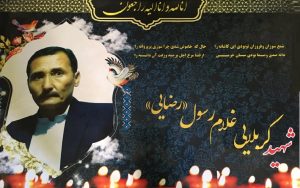 The Taliban has been conducting “targeted door-to-door visits” of people who worked with US and NATO forces, according to the confidential document by the UN’s threat assessment consultants seen by the AFP news agency.
The Taliban has been conducting “targeted door-to-door visits” of people who worked with US and NATO forces, according to the confidential document by the UN’s threat assessment consultants seen by the AFP news agency.
The report, written by the Norwegian Center for Global Analyses, said the group’s fighters were also screening people on the way to Kabul airport.
“They are targeting the families of those who refuse to give themselves up, and prosecuting and punishing their families ‘according to Sharia law’,” Christian Nellemann, the group’s executive director, told AFP.
“We expect both individuals previously working with NATO and US forces and their allies, alongside with their family members to be exposed to torture and executions.”
‘Lives under threat’
The Taliban has denied such accusations in the past and has several times issued statements saying fighters were barred from entering private homes.
It also insists women and journalists have nothing to fear under their new rule, although several media workers have reported being thrashed with sticks or whips when trying to record some of the chaos seen in Kabul in recent days.
Al Jazeera’s Rob McBride, reporting from Kabul, said the UN report contradicted the group’s assurances.
“The Taliban has been saying they have no interest in recriminations, reprisals. But we do know that in the provinces, at local levels, there have been cases of people being targeted. There have been reprisals. People have been killed,” he said.
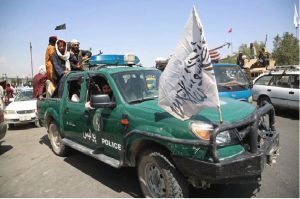 “The question is how much is this the work of the Taliban even at a local level or how much is just a reprisal between individuals, between families or ethnic groups. It gets very messy and very confusing as you get out into the provinces of Afghanistan.”
“The question is how much is this the work of the Taliban even at a local level or how much is just a reprisal between individuals, between families or ethnic groups. It gets very messy and very confusing as you get out into the provinces of Afghanistan.”
During the Taliban’s first stint in power, women were excluded from public life and girls barred from school. People were stoned to death for adultery, while music and television were also banned.
The United States invaded Afghanistan and toppled the group in 2001 following the September 11 attacks for providing sanctuary to al-Qaeda.
A video posted online by a high-profile female journalist this week for a government-run television station offered a different reality to the Taliban’s new image of tolerance.
“Our lives are under threat,” Shabnam Dawran, an anchor in state-owned broadcaster RTA, said as she recounted being shut out from the office.
“The male employees, those with office cards were allowed to enter the office but I was told that I couldn’t continue my duty because the system has been changed,” she said.
There have been isolated signs of opposition to the Taliban in parts of Afghanistan this week.
Small groups of Afghans waved the country’s black, red and green flags in Kabul and a handful of suburbs on Thursday to celebrate the anniversary of Afghanistan’s independence – on occasion in plain sight of patrolling Taliban fighters.
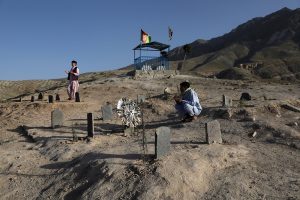 “My demand from the international community … is that they turn their attention to Afghanistan and not allow the achievements of 20 years to be wasted,” said one protester.
“My demand from the international community … is that they turn their attention to Afghanistan and not allow the achievements of 20 years to be wasted,” said one protester.
Taliban fighters fired guns to disperse dozens of Afghans in Jalalabad who waved the flag on Wednesday.
Russia also emphasised on Thursday that a resistance movement was forming in the Panjshir Valley, led by deposed Vice President Amrullah Saleh and Ahmad Massoud, the son of a slain anti-Taliban fighter.
“The Taliban doesn’t control the whole territory of Afghanistan,” Russian Foreign Minister Sergey Lavrov said.
In the Panjshir Valley northeast of Kabul, Ahmad Massoud, the son of Afghanistan’s most famed anti-Taliban fighter Ahmad Shah Massoud, said he was “ready to follow in his father’s footsteps”.
“But we need more weapons, more ammunition and more supplies,” Massoud wrote in the Washington Post newspaper.
Tens of thousands of people have tried to flee Afghanistan since the Taliban swept into the capital. The US on Thursday said it had airlifted about 9,000 people out of Kabul since August 14.
Chaos erupted at the airport this week, as frantic Afghans searched for a way to leave the country.
An Afghan sports federation announced a footballer for the national youth team had died after falling from a US plane he desperately clung to as it took off.
 Pressmediaofindia
Pressmediaofindia
